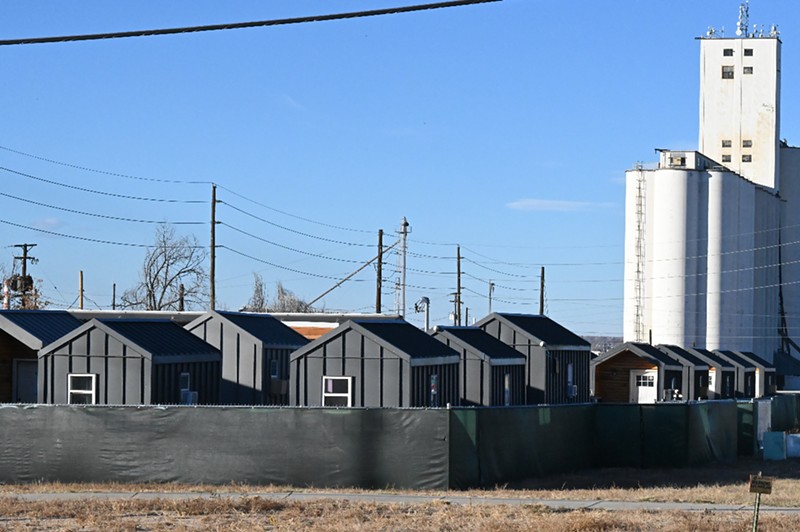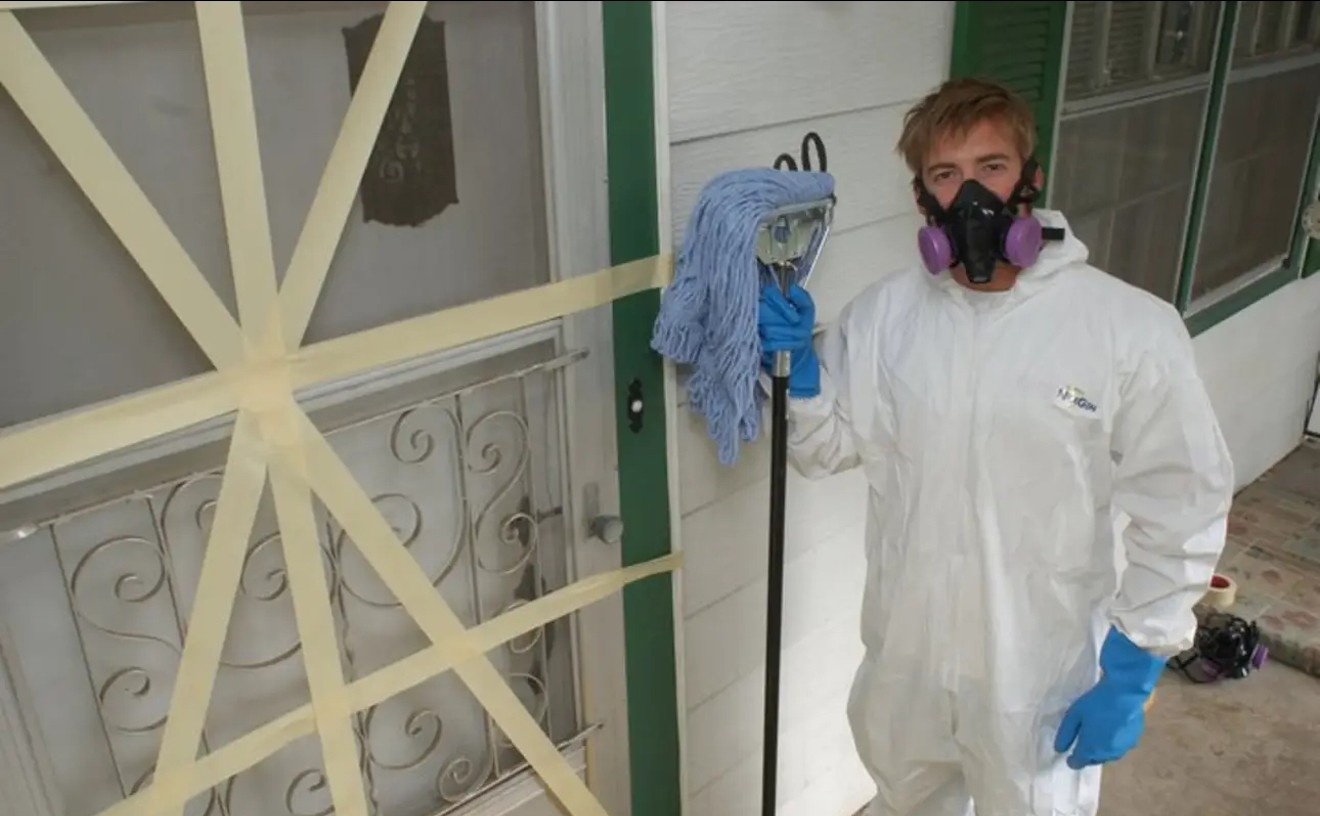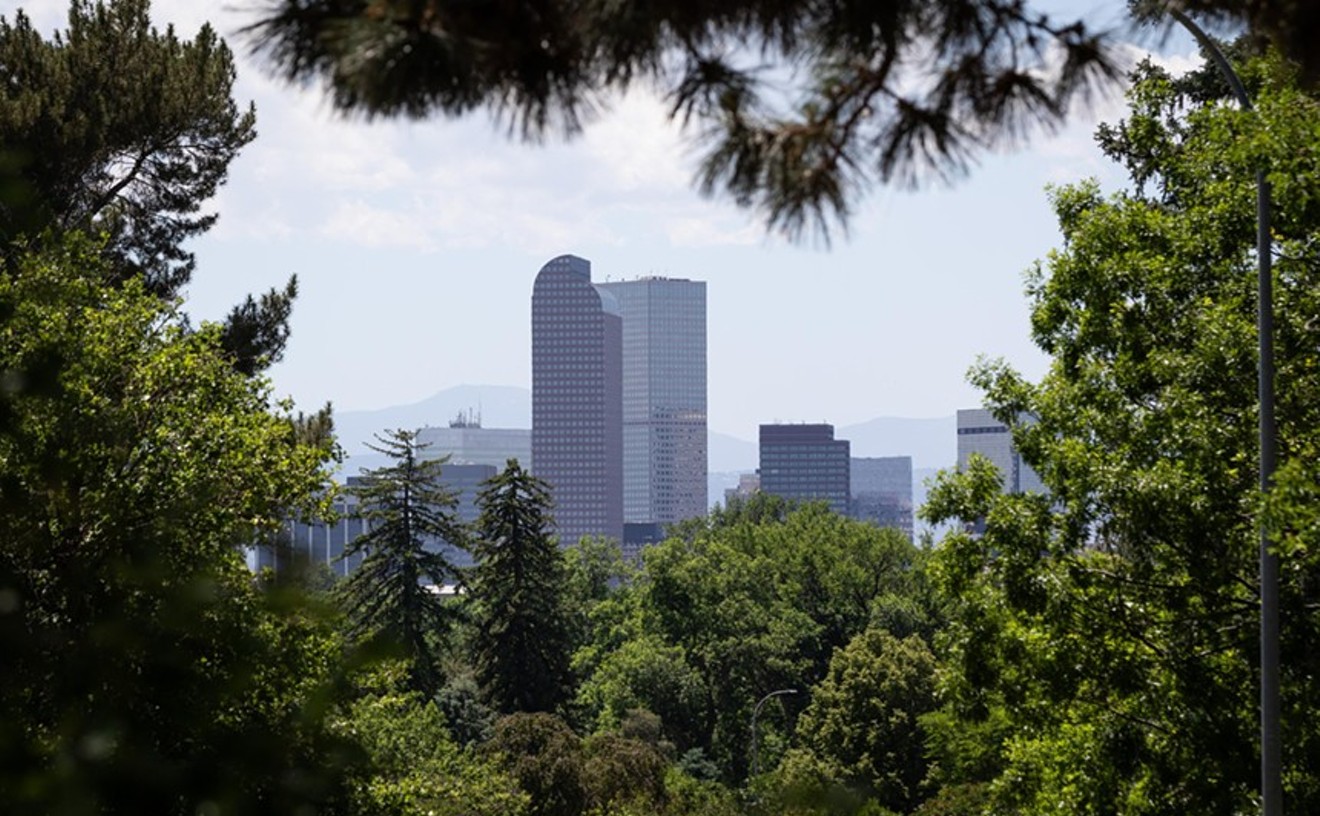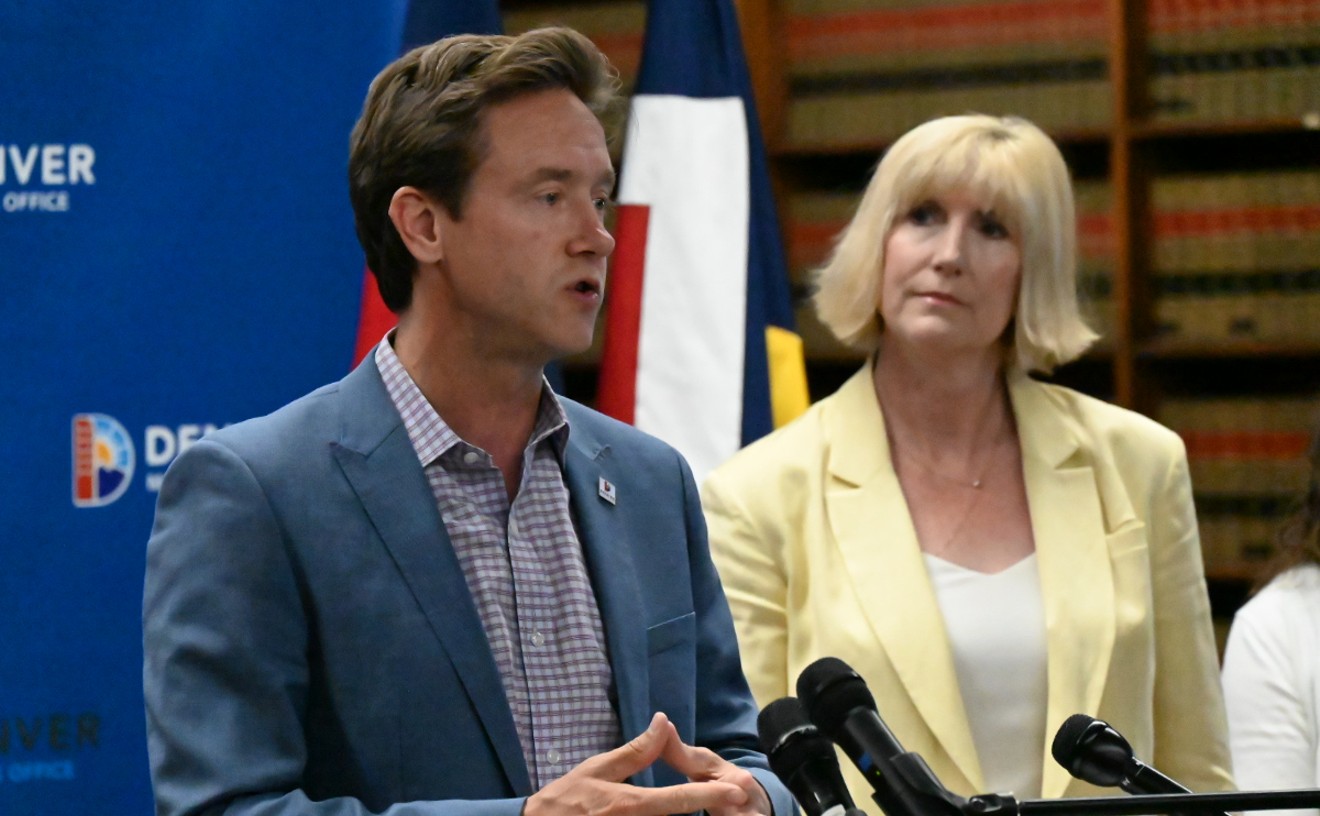"It's a nightmare," says Tammy Garza, a resident at the Welcome Village at 4001 Monroe Street, which is run by the Colorado Village Collaborative, Johnston's biggest micro-community partner and manager under his House1000 plan.
"I've been here seventeen months, and they haven't helped me at all," Garza tells Westword. "If this was a successful program, I would have been out of here in three months. But no one is here to help me."
Former resident Tyrone Barnes, who stayed at a CVC-operated SOS site at 4635 Peoria Street from 2021 to 2022, alleges that other residents pressured him to "fit in" by doing drugs. "If you don't fit in, you lose," he says. "These people made it more difficult for me to have housing; they made it more difficult for me to keep the housing I had [at the SOS]; these people made my life a living hell."
It's one of "the most toxic, the most awful, the most disorganized" operations that Claire Ryder, a former CVC employee who worked at the Peoria site, has ever seen.
"I realized pretty quickly how screwed up the place is," she says. "They're not helping people. ... There's been a ton of people that were evicted. There's been quite a few people that have died since they left the site."
The CVC has been pegged to manage and provide case management services to the largest city-funded micro-community announced so far, which is the site planned for 2301 South Santa Fe Drive in the Overland Park neighborhood. The nonprofit was founded in 2017 by Cole Chandler, who is now Johnston's senior advisor on homelessness resolution. The city will pay $3.8 million to the CVC to run the site through 2024.
When asked what sort of relationship the CVC has with Chandler, executive director Dede de Percin describes it as the same one the CVC would have with any other homeless resolution official in the city.
“It’s been over a year since Cole left,” de Percin says. “What we have is a typical working relationship that we would have with anybody working in housing and homelessness and anybody working in the county and city.”
Chandler no longer receives income or earnings from the CVC, de Percin adds, insisting that his status with the city did not help the CVC secure the contract to run the Overland micro-community.
“We’re a really competitive bidder in this space because it’s a model that we’ve been developing for a while,” she says. “We weren’t the only bidder, and we’re not the only proposed vendor.”
Four other service providers have been named so far, including Bayaud Enterprises, the Gathering Place, the Salvation Army and the Colorado Coalition for the Homeless. The City Council Safety and Housing Committee will consider the contracts for those four providers on Wednesday, November 15.
“It’s been over a year since Cole left,” de Percin says. “What we have is a typical working relationship that we would have with anybody working in housing and homelessness and anybody working in the county and city.”
Chandler no longer receives income or earnings from the CVC, de Percin adds, insisting that his status with the city did not help the CVC secure the contract to run the Overland micro-community.
“We’re a really competitive bidder in this space because it’s a model that we’ve been developing for a while,” she says. “We weren’t the only bidder, and we’re not the only proposed vendor.”
Four other service providers have been named so far, including Bayaud Enterprises, the Gathering Place, the Salvation Army and the Colorado Coalition for the Homeless. The City Council Safety and Housing Committee will consider the contracts for those four providers on Wednesday, November 15.
Bayaud Enterprises has been tapped to lead the micro-community at 12033 East 38th Avenue, where tiny homes can already be seen behind fencing; the contract is worth $2.3 million.
The Gathering Place and CCH will provide services at micro-communities citywide.
For $10 million, the Salvation Army will run the converted DoubleTree hotel in Central Park.
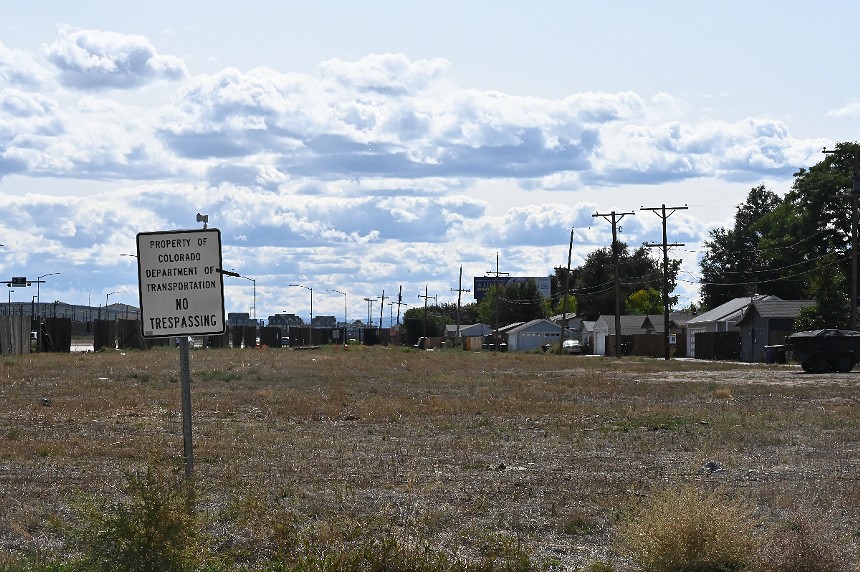
The City of Denver is building a micro-community for 150 homeless individuals in a state-owned field next to the residents of the Overland neighborhood.
Bennito L. Kelty
Overland residents criticized initial plans to put 150 residents in the triangular section of barren land selected by the city and sandwiched between 111 single-family homes and the freeway — leading the mayor to shrink the site to 120 units. However, it's still the largest micro-community that Johnston has proposed so far.
The initial selection of the CVC as the site provider came as city representatives were sitting down with the Overland Park Neighborhood Association and Neighbors of Overland North to work out a Good Neighbor Agreement to hold any potential service provider accountable to surrounding residents.
According to a letter from District 7 Councilwoman Flor Alvidrez to the mayor, CVC has backed out of signing a Good Neighbor Agreement, which Johnston has said is key to keeping the area around the micro-community safe and clean.
"Your office has also made it abundantly clear that the operator does not need a GNA to open or operate either micro-community site in my District," Alvidrez wrote to Johnston in the November 9 letter. "Now the operator, Colorado Village Collaborative, is refusing to participate in the GNA process until the contract is executed and cancelled my site visit for [Novermber 10]."
In Alvidrez's letter, she demanded from Johnston that "the contract (with CVC) be adjusted to read that a GNA will be executed prior to operation of the site." She also pushed for the micro-community to become a "high barrier entry site" so that sex offenders can't stay there; for more bathrooms to be provided and cleaned every day; foe concrete barriers to be put up to reduce sound; for the size of the micro-community be cut in half from 120 units to sixty units; for thirty units to be put in at a time; and other requests.
According to a letter from District 7 Councilwoman Flor Alvidrez to the mayor, CVC has backed out of signing a Good Neighbor Agreement, which Johnston has said is key to keeping the area around the micro-community safe and clean.
"Your office has also made it abundantly clear that the operator does not need a GNA to open or operate either micro-community site in my District," Alvidrez wrote to Johnston in the November 9 letter. "Now the operator, Colorado Village Collaborative, is refusing to participate in the GNA process until the contract is executed and cancelled my site visit for [Novermber 10]."
De Percin clarifies that the CVC is "not part of the process of the Good Neighbor Agreement in Overland until we have a signed contract with the city,” which won’t be inked until December at the earliest, she says.
“We can’t actually act on a contract that we’re not contracted for,” de Percin tells Westword. “And that contract is not even in front of city council yet, much less signed. ... It’s not that we’re not willing. Legally, we cannot [start working on a GNA].”
De Percin emphasizes that the CVC “will be excited to enter in a Good Neighbor Agreement when it happens.”
“We can’t actually act on a contract that we’re not contracted for,” de Percin tells Westword. “And that contract is not even in front of city council yet, much less signed. ... It’s not that we’re not willing. Legally, we cannot [start working on a GNA].”
De Percin emphasizes that the CVC “will be excited to enter in a Good Neighbor Agreement when it happens.”
Helene Orr, president of the Neighbors of Overland North, sent an open letter on November 9 — furious that the micro-community would allow sex offenders, despite a school bus stop being nearby.
"We heard in the meeting that Cole has stated there will be registered sex offenders at this site and it will be a low-barrier site open to hard drug users, violent offenders and people suffering mental trauma," Orr wrote in the letter. "If this is the case, we would like to hear from Cole directly why this is appropriate next to a school bus stop and an alley away from neighbors. There are other sites that appear better suited for such a high risk population."
In Alvidrez's letter, she demanded from Johnston that "the contract (with CVC) be adjusted to read that a GNA will be executed prior to operation of the site." She also pushed for the micro-community to become a "high barrier entry site" so that sex offenders can't stay there; for more bathrooms to be provided and cleaned every day; foe concrete barriers to be put up to reduce sound; for the size of the micro-community be cut in half from 120 units to sixty units; for thirty units to be put in at a time; and other requests.
Alvidrez expects concessions from Johnston, in part because he already nixed plans for three micro-communities that were smaller and slated for "wealthier neighborhoods," she wrote in her letter.
On November 13, Denver City Council is scheduled to consider a $1.3 million contract to continue operating tiny home villages at 40th Avenue and Monroe Street, which is the location of the Welcome Village and the neighboring Beloved Village.
At Welcome Village, Garza says, the staff treat people rudely and ignore them; she once had a heart attack in her tiny home and "nobody did anything to help" her, she claims.
At the SOS site on Peoria, Barnes tells Westword, workers "attack you mentally" and have turned a blind eye to its toxic, drug-fueled environment.
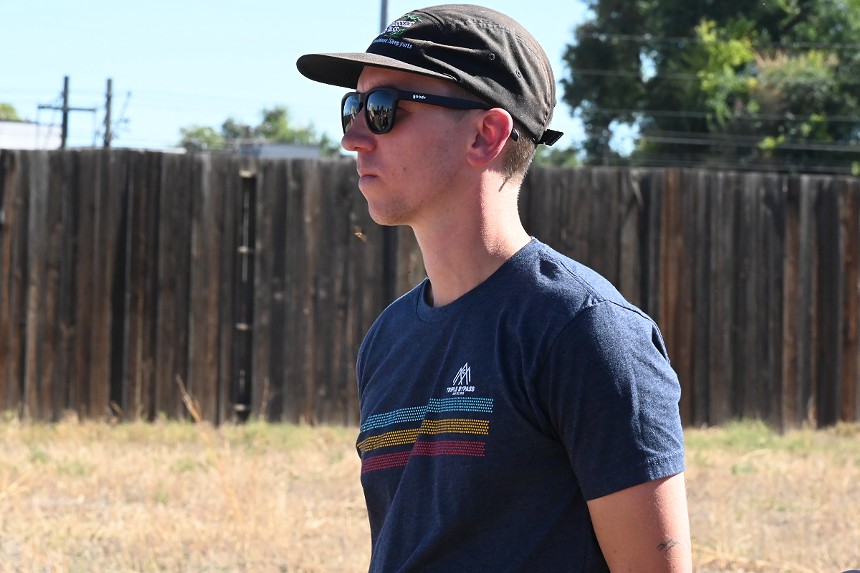 "Once I got there, I realized I'm not going to get no help," he says.
"Once I got there, I realized I'm not going to get no help," he says.
At Welcome Village, Garza says, the staff treat people rudely and ignore them; she once had a heart attack in her tiny home and "nobody did anything to help" her, she claims.
At the SOS site on Peoria, Barnes tells Westword, workers "attack you mentally" and have turned a blind eye to its toxic, drug-fueled environment.

Cole Chandler listened patiently as an Overland resident berated him and the City of Denver for bringing a micro-community to the neighborhood.
Bennito L. Kelty
Barnes, Garza and other former and current employees from other sites have complained to Westword about staff members having sex and using drugs with residents; one common complaint is that the CVC doesn't help its residents transition into permanent housing.
De Percin points out that CVC has put 70 percent of its Tiny Home Village residents into stable housing. Among residents who lived in their SOS sites in 2023, 30 percent are now in stable housing — which is 43 out of 150 people — and in 2022, 37 percent went from SOS sites to stable housing, or 109 out of 295 residents.
While the nonprofit can’t comment on accusations by former and current residents and staff, citing confidentiality policies, de Percin stresses that it has an “accountability process” to resolve grievances and avoid unjustly kicking people out.
“I can’t talk about staff and allegations of inappropriate behavior. All of that falls within confidentiality,” she explains. “Every community member signs a use agreement that outlines their responsibilities and requirements for being part of the program.”
“I can’t talk about staff and allegations of inappropriate behavior. All of that falls within confidentiality,” she explains. “Every community member signs a use agreement that outlines their responsibilities and requirements for being part of the program.”
Johnston's proposed micro-community sites have been stirring up controversy in many of the areas where they're going up. He's already had to cancel plans for three of the proposed micro-communities that were planned to go onto private land and has decreased the size of other proposed sites, including the ones he had planned for the Golden Triangle and Overland Park.
The CVC operates SOS sites consisting of tents in an enclosed area, as well as tiny home villages, which have small, temporary shed-like homes contained in small areas. The city has already sent a handful of homeless residents to a tiny home village operated by the CVC after they were caught in a sweep on 20th Street that happened on November 1, which the city referred to as its second "encampment resolution."
The CVC plans to onboard 35 employees — a 60 percent increase in staff — as it prepares to take on the contract to run the Overland Park micro-community, according to internal emails.
Leaders at the nonprofit have known that they're expected to run the micro-community since at least October 30, per the emails. The CVC expects its contract to run the micro-community to be finalized by December 1. Overland residents found out about the initial selection a week and a half ago.
The City of Denver is already spending more than $12 million in contracts with the CVC through 2024, according to city documents, with the contracts supporting CVC SOS operations. The city is also spending about $2 million in contracts through 2023 to support CVC Tiny Home Villages.
Alvidrez doesn't agree with Johnston's handling of the 2301 South Santa Fe Drive micro-community, nor the partnership with CVC.
"The lack of empathy, answers and cooperation from your office has caused division, verbal and property assaults to [NOON and OPNA] leadership," she says. "I am not writing you to completely stop this site like these other districts have, I am asking for a commitment to addressing the issues to this site and the concerns of the neighbors. My goal is to bring together Overland neighbors current and future in a peaceful and successful way."

